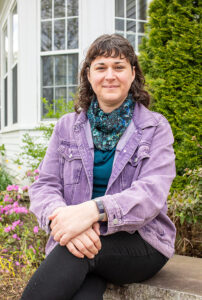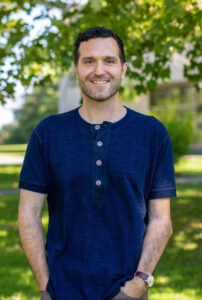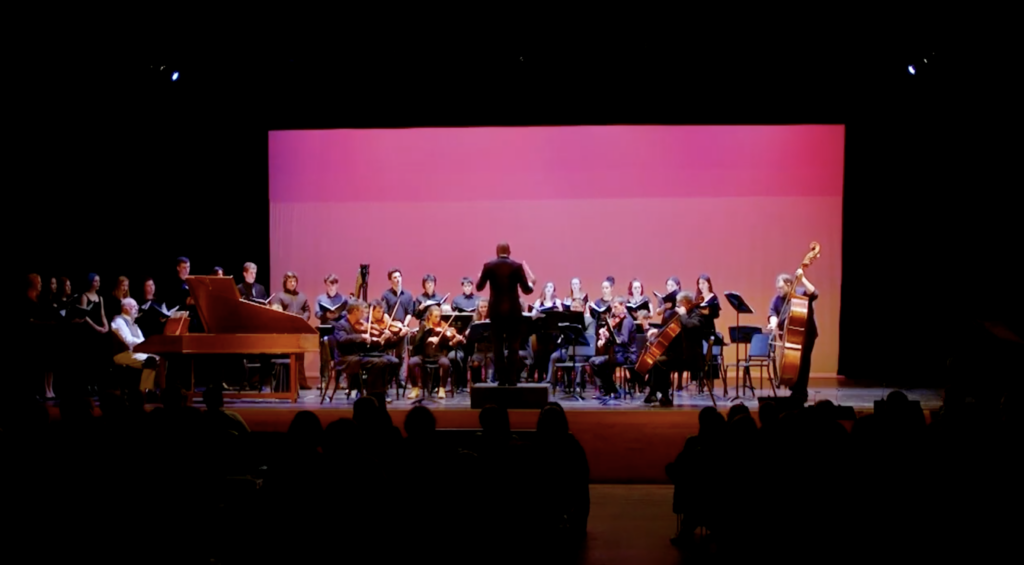

Two longtime Putney staff members have taken the stage to co-direct Putney’s music department.
On one side is David Ross, who has served as Putney’s assistant music director for the past six years. He shines when it comes to music theory, composition, improvisation, ensembles and recording arts. Beside him is Jenna Rae, a trained opera singer who has taught private voice lessons at Putney for the past eight years, and has a background in music education.
With the departure of Music Director Eric Thomas, they have joined forces to lead Putney’s music department. Together, they make an unstoppable team.
“Eric and I, we worked well together. He was a great guy, but we had a very similar skill set,” Ross said. “I think with Jenna, she fills in a lot of the gaps in my natural expertise. She brings a tremendous vocal background, choir knowledge and also just a general love of teaching itself. I anticipate we’ll each do our own thing in a way, and it’ll lend itself to a greater whole.”
Rae agrees.
“I know nothing about recording arts, and I could fake my way through jazz band — but I’m really glad I don’t have to,” she joked.
As they step into their new roles, their plan is to harness the existing energy of the program by continuing what has been working, while slowly assessing ways to make it even better.
One of the more early adjustments, says Rae, will be to update Sing in a way that “honors the traditions of the classical background, and also have it be engaging for students in 2024 and beyond.”
A Refresh to Sing
The whole premise of Sing, Rae said, involves the community coming together to participate in a four-part harmony, and is based on the assumption that most students are taught how to read music and sing in parts throughout elementary and middle school.
But times have changed.
“That isn’t really what’s going on in music education right now,” Rae said. “It’s just not the majority of students who are showing up here as freshmen. So there needs to be some acknowledgement that they’re not going to be able to just jump into four-part singing.”
She also wants to acknowledge that some of the songs contain elements of misogyny that not all students may be comfortable with, and she wants to explore how gender identity fits into Sing. For instance, sometimes students are singing in ranges that are inappropriate for their voices because they identify with a certain voice type, such as bass or soprano.
“What I’d like to do is break that apart a little bit and have opportunities for anybody, however they identify, to be in any section,” Rae said. “So they can sing melody, or they can sing harmony one, harmony two, harmony three — and they don’t have to have where they sing be a part of any kind of identity issue that they might be dealing with.”
Rae wants to ensure that any updates to Sing will continue the honor the deep tradition, and maintain a connection to alumni and the past.
Future Harmony
Rae and Ross would also like to further integrate the music program into the rest of the school by creating more opportunities to collaborate with other departments. For instance, Ross recently demonstrated the technical aspects of sound waves and acoustics during a science class. They would also like to work with the history department for a class such as ‘history of music,’ that explores the beginnings of music in humanity, and how it’s developed across the world.
“I think the cross-interdisciplinary stuff is really great,” Ross said. “It would be awesome to have as much of that as possible.”

Ross and Rae would also like to create more opportunities for meeting students where they are to encourage them to engage with the music department in a way that’s right for them.
For instance, they would like to focus on building up a vocal arts program, which often conflicts with rehearsals for the school musical and can be challenging for students who may want to do both.
“I’m hoping we can find a scheduling solution,” Rae said.
Along those same lines, they would like to create opportunities for students to play an instrument casually, without a more serious commitment that leads to time constraints and conflicts.
“I’d really like to find a way for students who play instruments who quit, or who haven’t played in a while, to have time to still incorporate that music into their lives at Putney,” Rae said. “Because there’s a lot of students who just leave the clarinet behind and never look back. And then by the time they get to be juniors and seniors, they’re like, ‘Oh, I wish I had done something.’”
 On another note, the jazz ensemble has been thriving. Ross wants to encourage more performances beyond Putney that get students out at venues in the surrounding community. In addition, Ross wants to explore other types of ensembles that align with students’ interests.
On another note, the jazz ensemble has been thriving. Ross wants to encourage more performances beyond Putney that get students out at venues in the surrounding community. In addition, Ross wants to explore other types of ensembles that align with students’ interests.
There’s also a lot of excitement around recording arts, which he plans to nurture.
The variety of experience between Ross and Rae allows them to build more engagement by establishing broader music opportunities designed to draw in all types of students.
“We have such a diverse group of students with different interests,” Rae said. “I feel like between the two of us, we can cover just about anything anyone wants to do in the music realm.”

